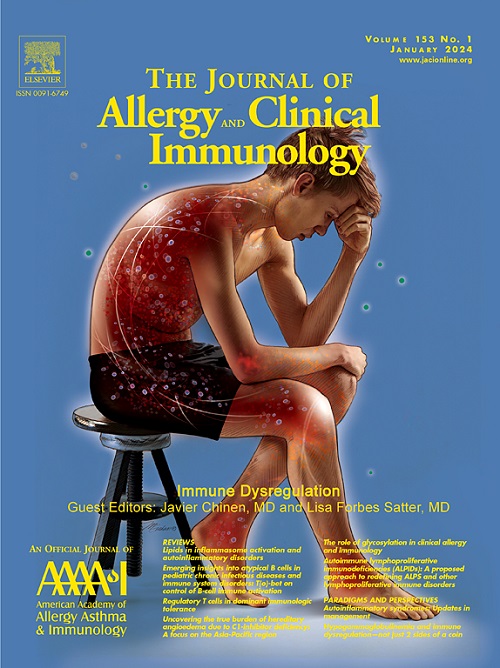Curation of gene–disease relationships in primary antibody deficiencies using the ClinGen validation framework
IF 11.2
1区 医学
Q1 ALLERGY
引用次数: 0
Abstract
Background
The Clinical Genome Resource (ClinGen) is an international collaborative effort among scientists and clinicians, diagnostic and research laboratories, and the patient community. Using a standardized framework, ClinGen has established guidelines to classify gene–disease relationships as definitive, strong, moderate, and limited on the basis of available scientific and clinical evidence. When the genetic and functional evidence for a gene–disease relationship has conflicting interpretations or contradictory evidence, they can be disputed or refuted.
Objective
We assessed genes related to primary antibody deficiencies.
Methods
The ClinGen Antibody Deficiencies Gene Curation Expert Panel, using the ClinGen framework, classified genes related to primary antibody deficiency that primarily affect B-cell development and/or function, and that account for the largest proportion of inborn errors of immunity or primary immunodeficiencies.
Results
The expert panel curated a total of 65 genes associated with humoral immune defects to validate 74 gene–disease relationships. Of these, 40 were classified as definitive, 1 as strong, 16 as moderate, 15 as limited, and 2 as disputed. The curation process involved reviewing 490 patient records and 3546 associated human phenotype ontology entries. The 3 most frequently observed terms related to primary antibody deficiency were decreased circulating antibody level, pneumonia, and lymphadenopathy.
Conclusions
These curations (publicly available at ClinicalGenome.org) represent the first effort to provide a comprehensive genetic and phenotypic revision of genetic disorders affecting humoral immunity, as reviewed and approved by experts in the field.
一抗缺陷:使用ClinGen验证框架的基因-疾病关系管理。
临床基因组资源(ClinGen)是科学家和临床医生、诊断和研究实验室以及患者社区之间的国际合作努力。ClinGen使用标准化框架,根据现有的科学和临床证据,建立了将基因疾病关系分为明确、强烈、中度和有限的指南。当基因-疾病关系的遗传和功能证据有相互矛盾的解释或矛盾的证据时,它们可以被争议或驳斥。目的和方法ClinGen抗体缺陷基因管理专家小组(AD-GCEP)使用ClinGen框架,对主要影响B细胞发育和/或功能的初级抗体缺陷(PAD)相关基因进行了分类,这些基因占先天性免疫错误(IEI)或初级免疫缺陷(pid)的最大比例。结果AD-GCEP共筛选了65个与体液免疫缺陷相关的基因,验证了74个基因与疾病的关系。其中,40种基因疾病关系被分类为明确的,1种为强烈的,16种为中度的,15种为有限的,2种为有争议的。策展过程涉及490例患者记录和3546个相关人类表型本体论(HPO)条目的审查。与PAD相关的最常见的HPO指标是循环抗体(Ab)水平降低、肺炎和淋巴结病。结论:这些研究是ClinGen免疫学临床领域工作组(CDWG)首次为影响体液免疫的遗传疾病提供全面的遗传和表型修订,并得到了该领域专家的审查和批准。这些策展可以在www.clinicalgenome.org上公开获取。
本文章由计算机程序翻译,如有差异,请以英文原文为准。
求助全文
约1分钟内获得全文
求助全文
来源期刊
CiteScore
25.90
自引率
7.70%
发文量
1302
审稿时长
38 days
期刊介绍:
The Journal of Allergy and Clinical Immunology is a prestigious publication that features groundbreaking research in the fields of Allergy, Asthma, and Immunology. This influential journal publishes high-impact research papers that explore various topics, including asthma, food allergy, allergic rhinitis, atopic dermatitis, primary immune deficiencies, occupational and environmental allergy, and other allergic and immunologic diseases. The articles not only report on clinical trials and mechanistic studies but also provide insights into novel therapies, underlying mechanisms, and important discoveries that contribute to our understanding of these diseases. By sharing this valuable information, the journal aims to enhance the diagnosis and management of patients in the future.

 求助内容:
求助内容: 应助结果提醒方式:
应助结果提醒方式:


